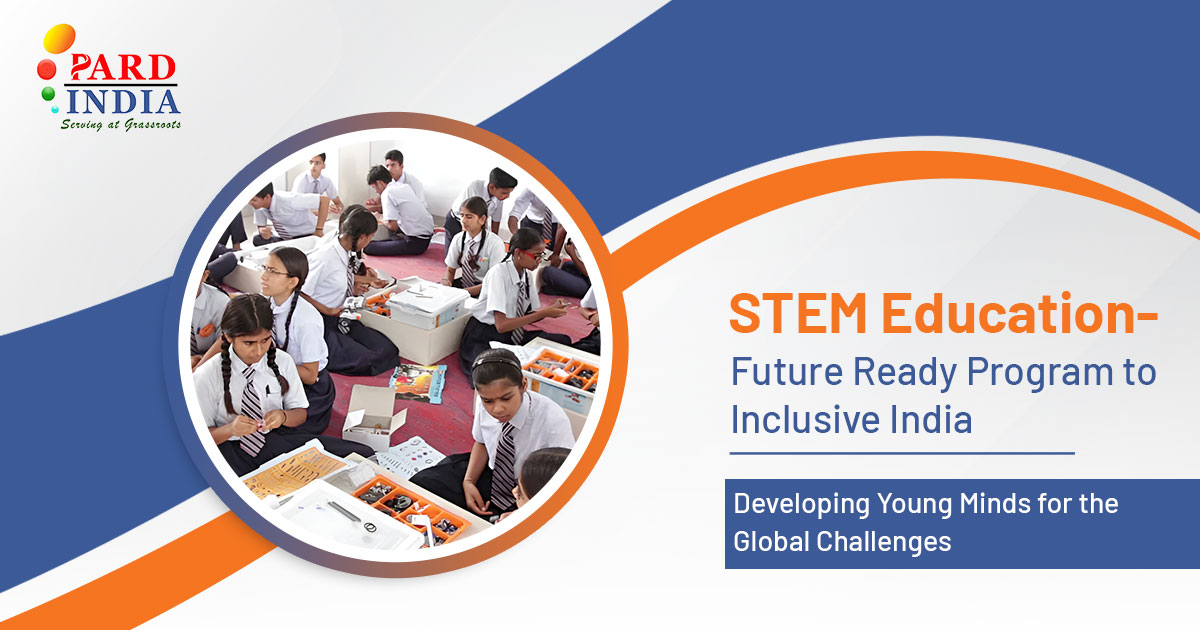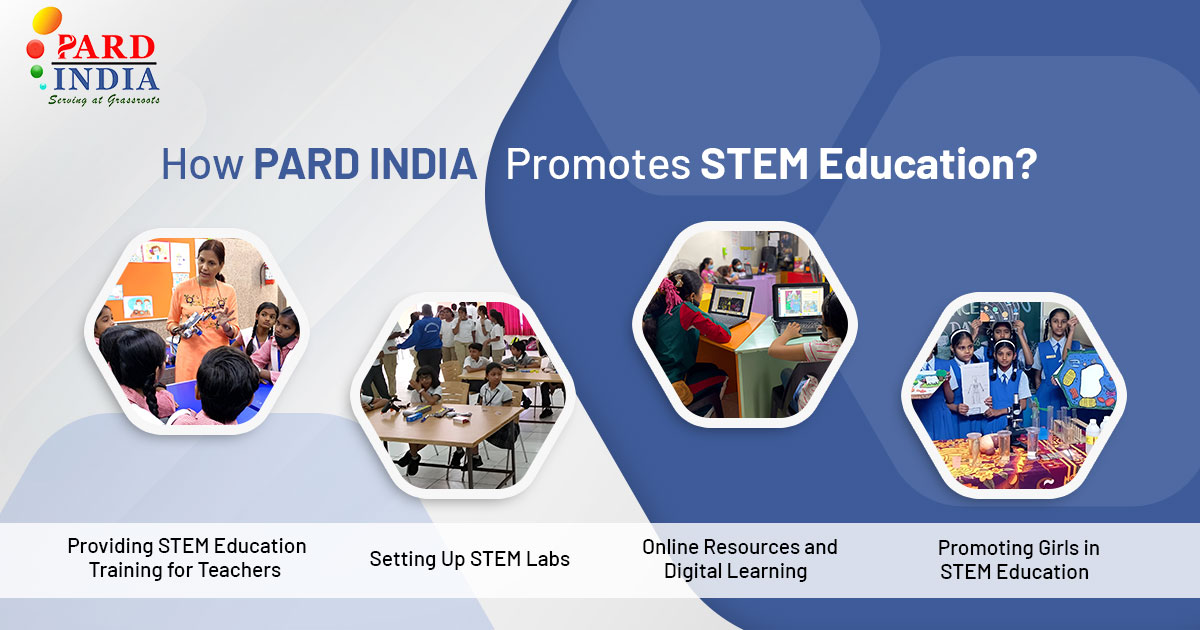STEM Education- Future Ready Program to Inclusive India
STEM (Science, Technology, Engineering, and Mathematics) education has reached an exceptional level in contemporary education. However, equitable access to high-quality STEM education remains an imperative challenge for many, especially in underprivileged communities. In this context, PARD INDIA, a grassroots NGO in India, plays a significant role in narrowing the difference through its educational programs under its READ Project. We ensure that all students, regardless of their socio-economic background and gender, get an opportunity to innovate, learn, and explore science and technology for the betterment of the world.
Moreover, to accomplish meaningful growth of our country, persistent advancement of technology and scientific abilities is necessary. Expert engineers, scientists, and others drive the development of technology that allows the country to balance its competitive edge in the world marketplace and enhance the well-being of its citizens. In a country of over 250 million children who are going to school, they are the future of India’s economy. Equity and innovation rest on how beneficially we embed STEM into classrooms, especially in below-average communities and government schools.
Children will not have the needed skills to get a qualified job or thrive in the competitive world if we are thinking of depending on the conventional education system. STEM education is the most impactful way to respond to the rapid change in trends and desirable skills in the workforce. It is one of the best ways to ensure that kids will not face any challenges in this complex world.
PARD INDIA, one of the best NGOs for education in India, is working tirelessly to promote STEM education at the grassroots that is attainable to all. We are introducing scientific teaching methods, setting up digital training centres, promoting scholarships, and even providing teaching programs for teachers to improve their STEM learning. In this blog, we will discuss the essential features of STEM and how we are transforming it into a space for future minds.
About “STEM Education”
STEM is an acronym for Science, Technology, Engineering, and Mathematics. It is a learning method that combines all these subjects. Currently, these subjects are learned separately, even though they are interconnected. Consequently, students usually cannot apply the concepts learned to real problems. That is why it reduces their productivity, comprehension, and implementation. This is a paradigm shift from conventional education that is desperately lacking in experiential learning to an education that is much superior and more profound.
As an NGO working for education in India, PARD INDIA promotes STEM education at the grassroots of our society. This education enables children to conduct experiments, fail, and learn by themselves to achieve the right results instead of learning through textbooks. STEM education enhances curiosity and makes the learning process exciting, meaningful, and long-lasting. Critical thinking, problem solving, teamwork, inquiry, and project-oriented learning are the pillars of STEM education.
Our national agendas are also targeted at raising children to be all-around individuals, with important 21st-century competencies, within a futuristic, wealthy, integrated, and developed nation, characterised by a human-oriented approach at its core. This is evident at the highest level in the National Education Policy (NEP 2020), the 5th National Science Technology & Innovation Policy (STIP), and the focus of India’s G20 presidency this year.
The Significance of STEM Education
STEM education is not limited to learning subjects. Therefore, it promotes creativity, critical thinking, and a problem-solving approach. In today’s rapidly changing digital world, where technology and automation are advancing, STEM core skills are imperative for securing future professional opportunities. We invest in STEM education to shape significant growth in innovation, employment opportunities for all young minds, and economic development of our nation.
However, not all deprived children (V-kids) have access to quality STEM education. Numerous schools in economically deprived regions lack appropriate resources, trained teachers, and innovative digital tools to educate STEM effectively. This is where the best education NGO in India fills the gap and ensures equal science-based education opportunities for all.
Addressing STEM Education Gaps from an Early Age
Regardless of being the world’s largest ecosystem for all levels of education in science and engineering, India faces a contradiction that around 30% of engineering graduates are either underemployed or unemployed due to skill gaps. According to the ASER 2023 info, students of class XI or higher only get 31.7% enrolment in STEM subjects, whereas 55.7% are in the Humanities/Arts stream. Rural students, girls, and first-generation learners are specifically unappreciated. Over 65% of Indian children in most government schools are enrolled, but they still work with obsolete teaching, undertrained teachers, and nominal infrastructure. Traditional rote-based education does little to nurture curiosity, problem-solving, and experimentation in the foundations of STEM.
Major Challenges in STEM Education in India
Here are the significant challenges in STEM education in India that prevent the modern education of deprived kids and block their future opportunities:
- Socio-economic Disparities
Children from below-average income families constantly have restricted access to high-quality Science, Technology, Engineering, and Mathematics (STEM) education. Numerous students’ learning and understanding experiences are hampered by a lack of bare minimum resources like textbooks, computers, and even average infrastructure. - Urban-Rural Division
The education systems of urban and rural areas are immensely different. Insufficient infrastructure, restricted technology access, or a lack of trained educators are common problems children face in rural areas. - Gender Inequality
In the extended part of India, girl children are inhibited from entering STEM areas by cultural standards and preconceptions. As an outcome, there is considerable gender disparity in these areas of involvement and enrolment. - Lack of Practical Experience
Scholars continually lack access to opportunities for experiential understanding and real-world STEM application. This discrepancy might deteriorate comprehension and curiosity. - Outdated Curriculum
Classic, rote-learning methods are still used in multiple educational institutions. Children often do not get engaged in this method of education. Also, in this teaching method, they do not develop problem-solving and critical thinking capabilities in STEM disciplines.
How PARD INDIA Promotes STEM Education?
At PARD INDIA, a grassroots NGO in India, we redefine what STEM means for underprivileged children. Covering a footprint across 100 villages in multiple states, our approach is implemented, holistic, and scalable in real-world requirements. Let’s examine the factors determining how we promote STEM education for V-kids.
- Providing STEM Education Training for Teachers
Teachers have an imperative role in building and shaping students’ interest in STEM subjects. We conduct special training programs to equip teachers with all contemporary STEM teaching practices. These crucial programs concentrate on interactive understanding and learning techniques, real-world applications, and digital tools of STEM concepts.For instance, charities for education in India and NGOs such as ours organise workshops for teachers that help them integrate STEM ideas into their daily syllabus. Furthermore, it ensures that schools and students receive quality STEAM education even with limited resources. - Setting Up STEM Labs
In the most valuable ways, our Non-Profit Organisation (NPO) has been working on securing project funding to enhance STEM learning and understanding by setting up labs for practical practices in schools and other educational platforms. Moreover, these labs give students hands-on experience in subjects like coding, artificial intelligence, and robotics. Upon securing the project funding, we collaborate with schools to provide desktops, 3D printers, and other essential equipment. Thus, it allows students to understand through practical applications. - Online Resources and Digital Learning
The digital approach has made learning methods more accessible than ever. At PARD INDIA, we have extended online learning platforms and digital training centres to give STEM education to underprivileged students who might not have access to standard schools. - Promoting Girls in STEM Education
Gender equality in STEM education is an imperative issue globally. Numerous education programs particularly concentrate on breaking gender stereotypes and encouraging girls to take up STEAM subjects. - Scholarships and Mentorship Programs
There are numerous talented students from deprived backgrounds (V-kids) who struggle to pursue higher education due to financial crises. We step in by providing scholarships, career guidance, and mentorship programs to promote education at its core.
The Bright Future of STEM Education
With prompt technological advancements, the immense demand for STEM professionals is rapidly growing. Yet, STEM education must be accessible and inclusive to all who value the advantage of innovation. As an NGO working for education in India, our educational programs play an imperative role in this mission by delivering valuable resources, opportunities, and appropriate training to underserved communities. Many organisations like ours are promoting STEM education, which is increasing rapidly. So, it means the future of millions of young minds is in the right direction.
By investing in STEM education today, we are creating a chain of more innovative, technologically progressive, and inclusive worlds for future opportunities. STEM education is the core key to education innovation, and every child deserves access to it. By improving our educational program, thousands of underprivileged students (V-kids) now have a great chance to learn, understand, grow, and contribute to society. We are trying to keep this educational journey as successful as possible so that lack of education can never stop a child from living his or her dream.
Let’s Promote & Build STEM Education with Us!
Despite India’s meaningful advancement in STEM education, concerns including gender bias, out-of-date curriculum, and socioeconomic mistreatment still exist. There is still much more to be done to encourage diversity and creativity, regardless of initiatives like the National Education Policy 2020. Furthermore, if you are an innovative and education enthusiast, volunteer and contribute to PARD INDIA, which is a grassroots NGO in India. Together, we can build a world where every child, regardless of background, has the chance to become a scientist, engineer, innovator, or anything they want.
VOLUNTEER WITH US



Leave a Reply